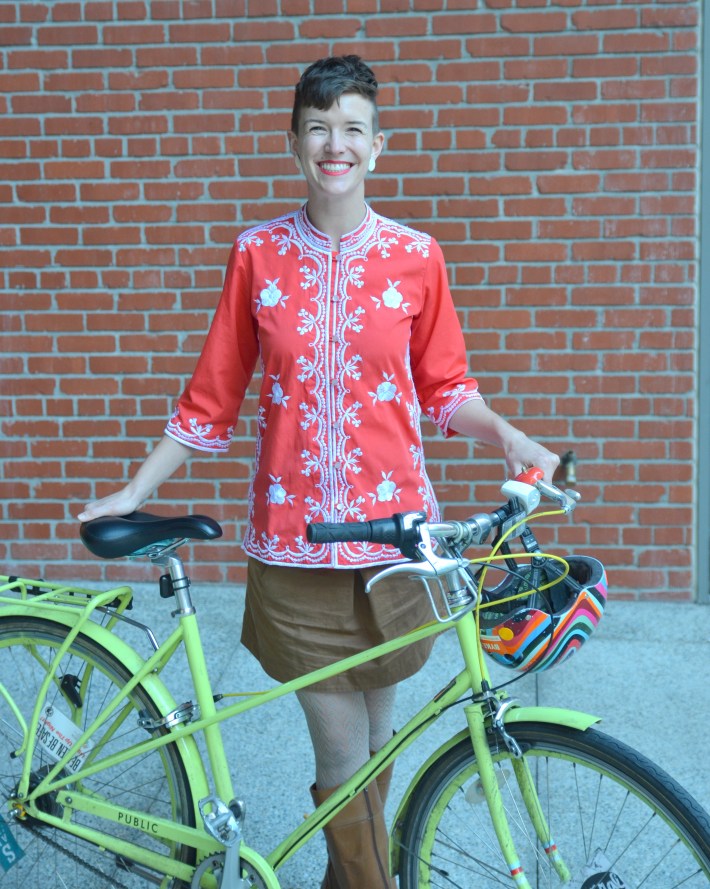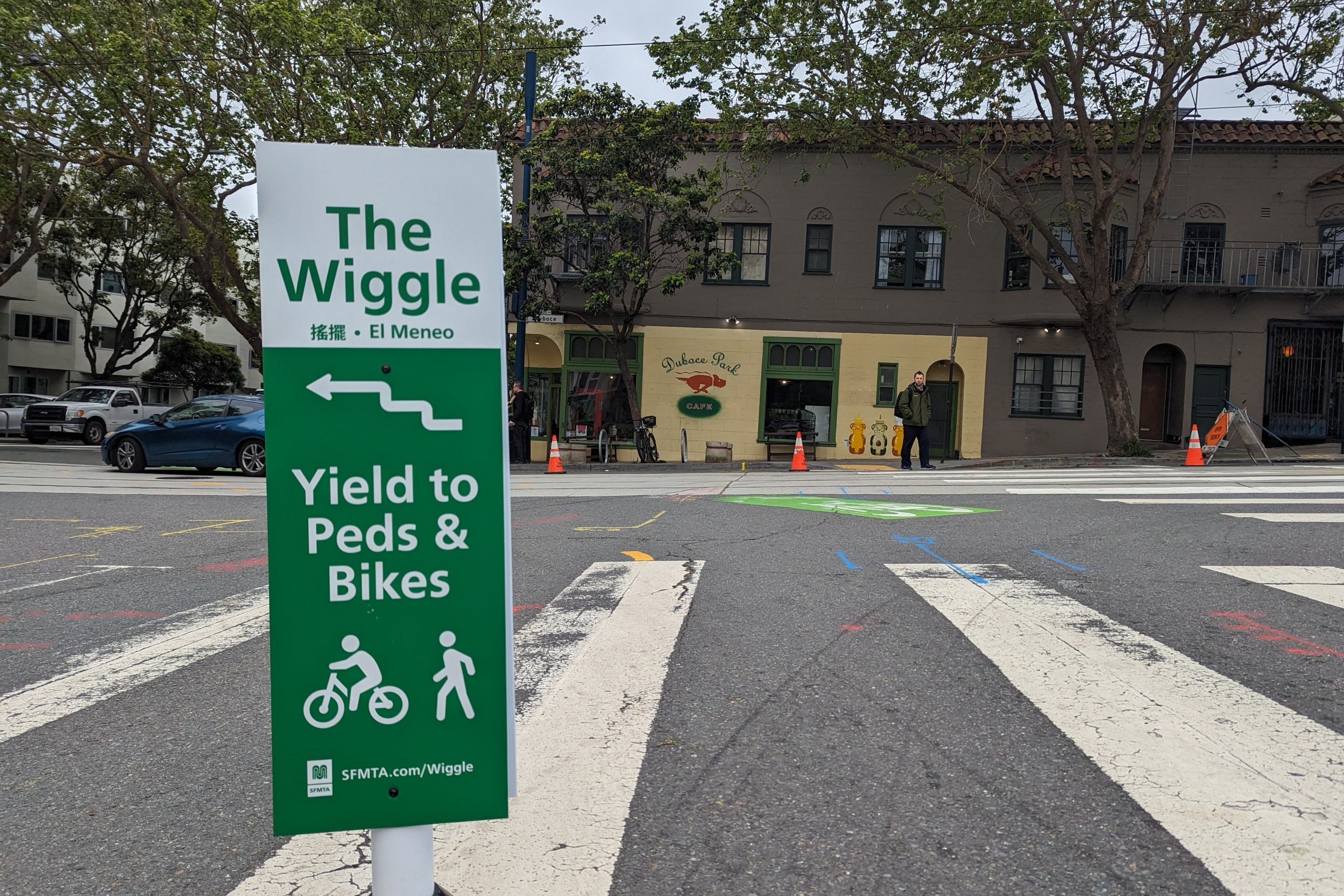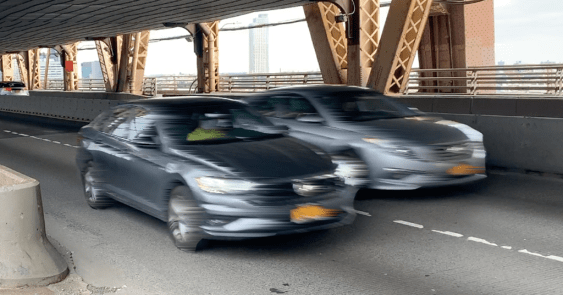Streetsblog Talks with the SF Bicycle Coalition Interim Executive Director
4:41 PM PST on January 14, 2016

This week Margaret McCarthy began a six-month term as the San Francisco Bicycle Coalition's Interim Executive Director. She replaces Noah Budnick, who resigned last year. She starts with the SFBC in the midst of new and ongoing projects and, perhaps, a touch of residual tension after its first contested board elections. McCarthy is not a new face at SFBC, where she worked as Volunteer Coordinator and Program Director. Streetsblog sat down with her at SFBC's new digs on Market Street to talk about the police, the politics, the plans, and the future of cycling in San Francisco.
Streetsblog: What's first on your agenda for the SFBC?
Margaret McCarthy: So many things! I'm learning about some budgetary processes which I'm totally excited about. Those are the things that keep the organization running. In addition, there are some exciting bike projects coming up in 2016. For example, raised bike lanes on Masonic Street, Second Street, Polk Street--construction should begin on all of those in 2016. We're excited about prospects for Page Street, a busy bike route that could certainly use some improvement. And I'm excited about the expansion of Bay Area Bike Share. Just to name a few!
SB: Tell me more about the raised bike lanes.
M: Right here on Market Street there is a two-block demonstration project. The SFMTA is trying four different treatments. It's about the height of the lane, the slope, and the curb access and they want to see a few different things to see what's going to be the most effective type of raised bike lane for San Francisco.
SB: How are they doing the intersections?
M: The bike lane slopes back down to street level. But this is a test project that will inform other projects. However, on 2nd street it will include raised sidewalks and bike lanes across the alleyways to slow car traffic coming out. The Caltrans raised bike lane guidelines did leave it open for bike lanes to go back to street level at intersections. The SFBC was disappointed and suggested it should have been better. The raised lane should persist across the intersections.
SB: What else do we have to look forward to in 2016?
M: Bay Area Bike Share expansion. This is going to be magnificent. We have under 400 bike-share bikes in SF right now. Very nice pilot, but it's small. And with the expansion SF is going to go up to 4500 bikes. So I'd call that a significant expansion.
SB: Those are all in the city of SF?
MM: Yes, but with even more Bay Area-wide. This is huge! When it's complete, SF will have the densest bike-share system in the US. How's that!
SB: Pretty exciting.
M: (motioning to the window) I want one right here.
SB: It'd be crazy not to. Even if your office wasn't here, it's Valencia and Market.
M: And you've got to get off the streetcar here to go down Mission.
SB: What about the Bay Bridge bike path?
M: Obviously, we want a connected Bay Bridge. People would love to bike across it. But bridges are really slow projects. There are going to be meetings to get feedback on things such as “where would you like this to land?” or “Is ten feet suitable or do you need 15?”
SB: SFPD?
M: (laughs) Those are some letters.
SB: Captain Sanford made it official that he hates bikes, did you hear?
M: Did he say that to you?
SB: (laughs) No. But he did officially say he's against Bike Yield in his department newsletter. What do you do about law enforcement priorities?
M: This is really about Vision Zero. The SFPD has committed to “focus on the five.” This means they need to be focusing on the five most dangerous behaviors in the five most dangerous locations on a per-district basis. They have that data. And they have been charged by the chief with data-driven enforcement. And this is really where we want to see the SFPD move in 2016--fulfilling their commitments and keeping the promises.
SB: Focus on the five. Data driven. That's great but I have yet to see the data that says bike rolling stops is one of the five.
M: Exactly! It's not. They have the data. It's not one of the five.
SB: What else comes to mind?
M: Oh gosh. We just have a lot of great projects. We're expanding our community bike-build program. We partner with different locally based community groups and we take reclaimed bicycles from the MTA, from the police department and working with these community groups we redistribute them to their constituents. We run a workshop where we do basic maintenance together. They get to pick out a bike that's the right size and fit for them. We offer a free bike education class. And then at the end of the day the participants get to keep the bicycle so this is a program that is taking bikes that have been sitting, often in warehouses for years, rusting. We get them into the hands of more San Franciscans who want to ride.
SB: So there was a little bit of a schism at the SFBC. Can you tell us what that was about and how you're dealing with it?
MM: So, it sounds like you're referring to the recent board elections, is that correct?
SB: Was there a schism I don't know about?
M: No! Just want to make sure. So as you probably know on Dec. 30 we closed the board election here and we had more members than usual decide to run. We are extremely fortunate—I know many non profits have difficulty recruiting members to run for their board, so I think we're in a great position with so many engaged, passionate members who want to serve the organization in this capacity. We'll see what the results of that are, but regardless, I'm really looking forward to working with this group of people who are committed to making San Francisco a safer city for biking and living.
Read More:
Stay in touch
Sign up for our free newsletter
More from Streetsblog San Francisco
Commentary: There is Zero Ambiguity to the West Portal Tragedy
What happened in West Portal was entirely predictable and preventable. The city must now close Ulloa to through traffic and make sure it can never happen again
Independent Safety Advocates Beef up the Wiggle
Signs and soft-hit posts installed by advocates make the Wiggle bike route calmer and safer for cyclists and pedestrians




